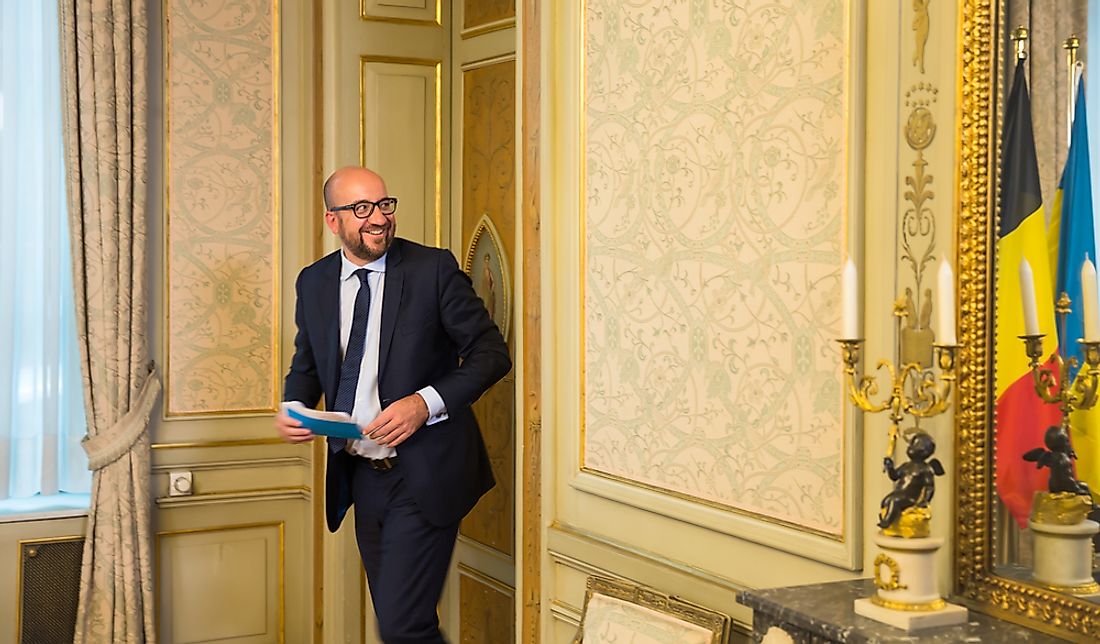Prime Ministers Of Belgium Since World War II

Belgium has a federal parliamentary democracy under a constitutional monarchy, where the king appoints the Prime minister to head the government. The governments formed after Belgium’s independence in 1830 had the position known as formateur that lead and formed the government, but this position did not have well defined duties. It was in 1918 that the title prime minister was incorporated in the official documents. Over the time, the powers associated with prime minister increased over that of the King and in 1970, with the first state reform, it was incorporated in to the Constitution of Belgium. Prime minister presides over the Council of Ministers and is responsible for formulation of policies and their execution. Prime minister can also ask for a vote of no confidence motion, which can also lead to the termination of the government. When the prime minister resigns the government dissolves.
Prime Ministers Of Belgium Since World War II
Hubert Pierlot (1939-1945)
Hubert was a lawyer prior to joining politics. He was sworn in as prime minister a short time before Belgium entered World War II. As a result of Belgium’s occupation by Nazi Germany, he went to exile and headed the Belgian government from France and later from Britain. He both as prime minister and minister of defence from his position in exile. In 1940, the year Germany attacked Belgium, there was a serious disagreement between Huber Pierlot and the King of Belgium Leopold III. Hubert was of the view that the King should go to exile rather than surrender to German Army, which the King considered a cowardly act. After liberation of Belgium in 1944, Hubert returned to the country and headed the new government. Unable to resolve the new challenges facing the nation, his government failed and he resigned in 1945 before quitting politics in 1946.
Paul – Henry Spaak (1947-1949)
Coming from a famous Belgian politically family Paul – Henry Spaak was elected the prime minister of Belgium three times. Firstly from1938 to 1939, secondly in 1846 and finally between 1947 and 1949. He was one of the most prominent Statesman from Belgium in post World War II politics. He was a primary advocate for European cooperation. His role was crucial at the formation of European Economic Community, which was succeeded by the European Union. He was also behind the formation of North Atlantic Treaty Organization (NATO) and Benelux agreement. In 1945, he helped in drafting the United Nations Charter and was elected as president of the United Nations first General Assembly. He retired from politics in 1966.
Gaston Eyskens (1949-1950; 1958-1961; 1968-1973)
Eysken was an economist and the prime minister of Belgium from 1949-50, 1958-61 and 1968-73. He faced major linguistic and ideological conflicts within Belgium in 1950. In 1958, he showed his leadership at finalizing the school pact, giving equal financial aid to parochial and public schools. Realizing that Belgium might no more be able to tackle the economical and political situations of Belgian Congo, in 1960 he persuaded the parliament to grant independence to Congo. The bloody wars that followed the independence of Congo and internal problems in Belgium toppled his government in 1961.
Paul Vanden Boeynants (1966-1968; 1978-1979)
Paul Vanden Boeynants was elected twice as the Prime Minister of Belgium. Paul, a French speaking Belgian politician, was a longtime Member of Parliament. In 1961 he served as the minister for the middle class. His handling of the language crisis (1968) in Belgium was criticized, but it was the corruption and fraud that eventually ended (1986) his career as politician. Later in 1989, he was kidnapped by left wing group, only to be released a month later by paying ransom of over $2 million.
Economy of Belgium
Belgium has an open vibrant economy based private enterprise economy and has capitalized on its geographical location. The country has a highly developed and efficient transport network system. The industries are concentrated in the highly populated areas like Flanders in the north. The country has few natural resources and therefore imports large quantities of raw materials and export substantial quantities of manufactured goods. The economy of Belgium grew by 1.4% in 2015.
Prime Ministers Of Belgium Since World War II
| Prime Ministers of Belgium Since World War II | Term(s) in Office |
|---|---|
| Hubert Pierlot | 1939-1945 |
| Achille Van Acker | 1945-1946; 1954-1958 |
| Camille Huysmans | 1946-1947 |
| Paul-Henri Spaak | 1947-1949 |
| Gaston Eyskens | 1949-1950; 1958-1961; 1968-1973 |
| Jean Duvieusart | June to August of 1950 |
| Joseph Pholien | 1950-1952 |
| Jean Van Houtte | 1952-1954 |
| Théo Lefèvre | 1961-1965 |
| Pierre Harmel | 1965-1966 |
| Paul Vanden Boeynants | 1966-1968; 1978-1979 |
| Edmond Leburton | 1973-1974 |
| Leo Tindemans | 1974-1978 |
| Wilfried Martens | 1979-1981; 1981-1992 |
| Mark Eyskens | March to December of 1981 |
| Jean-Luc Dehaene | 1992-1999 |
| Guy Verhofstadt | 1999-2008 |
| Yves Leterme | March to December of 2008; 2009-2011 |
| Herman Van Rompuy | 2008-2009 |
| Elio Di Rupo | 2011-2014 |
| Charles Michel (Incumbent) | 2014-Present |







